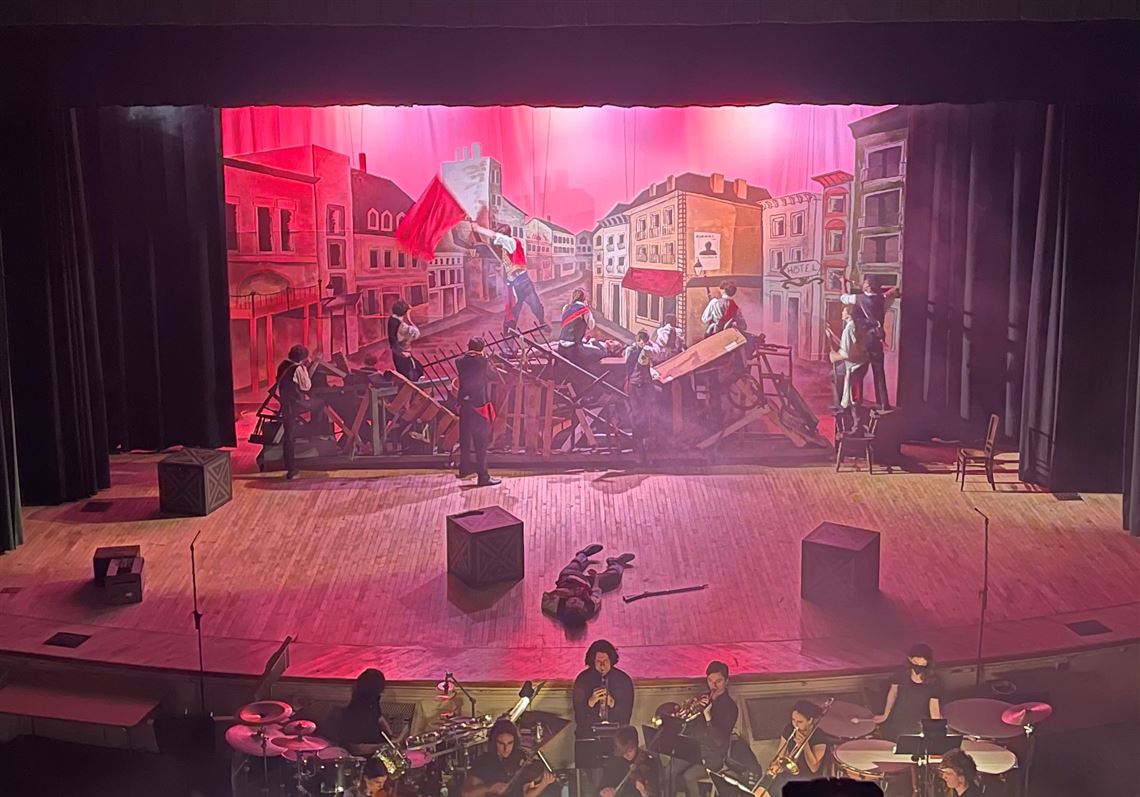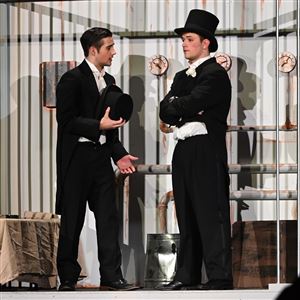The Kelly Critics is a joint program of the Post-Gazette and Pittsburgh CLO's Gene Kelly Awards for Excellence in High School Musicals, in which students at Kelly schools review musicals at other Kelly schools. Reviews are edited by Post-Gazette senior theater critic Christopher Rawson.
Walking into Allderdice High School on a rainy Saturday night, you could feel the energy. People bustled around and conversation filled the hallway. Even after the tickets were sold and everyone sat down in the ornate auditorium, the energy was there.
“Les Miserables,” ironically, is a show famous for its sorrow. Death plagues almost the entire story, as many a character washes ashore on the beach of misery and despair. Brief spurts of comic relief separate long stretches of emotional pain. But to quote Oscar Wilde: “The suspense is terrible. I hope it lasts.”
Such is the case with the pain and heartbreak in this musical: It rocks you to your core, leaves you breathless, aching but somehow feeling healed. And this is made possible by several simple expedients which create an atmosphere of total immersion.
First, the effects. Lighting and sound are used to create distinct atmospheres and moods. During a firefight, red flashes light the stage; during one character’s death scene, swirls of smoke seem to envelop him in the void. Spotlights create a sense of isolation that can make one character seem totally alone. These effects contribute to the tragedy which courses through much of the play.
Next, movement. The movements of characters are used to show personality and intention. When one character is publicly scandalized, the others turn toward her like an accusing mob. Inspector Javert, a harsh and cruel authoritarian, walks with a heavy, soldierly step. Slouching postures indicate weakness, upright postures strength. In this way, movements tell much of the story, especially where words are absent.
This relates to one of the most important aspects of the play itself — intention. Often the characters look heavenward, to God. They ask for relief, or survival, or mercy. And this, sadly, is seldom provided. However, “Les Mis” is a play about hope. It is a discussion of what it takes to survive, of refusing to quit.
Few characters in the play quit. There is a song of survival, sung by the ensemble at the end, which brings such a bright ray of hope as to overcome all the tragedy and misery the characters endure.
Such hope deserves exploration. In our world, hope often seems fleeting. We are reminded constantly of the greed, graft and disaster that infect our society. And “Les Mis,” unflinchingly, depicts the evilness of humanity. Alongside this evil, however, we see the bright rays of hope – and this leaves us feeling better.
Why is that important? Because sometimes life is awful. Often we are overpowered by problems and fears, haunted by the past. But “Les Mis” offers a new dawn.
It shows that even the profoundest darkness can be broken with light. This is necessary. So many people struggle to hope. And this show is a powerful reinvigorating agent, to remind us of what matters. The characters are persecuted. They suffer mightily. But they work together. They die for one another. They pray. And though many of them suffer bodily deaths, their spirits survive. Notwithstanding one’s religious convictions (or lack thereof), this kind of indestructible hope is a powerful antidote to the darkness and fear.
With good effects and skillful use of body language, Taylor Allderdice does this show justice. The audience reflected as much — everyone seemed to be on a hairpin trigger. Applause resounded during scenes where it would not normally appear, and came quickly after the end of every number.
At show’s end, everyone rose to their feet within seconds. The ovation lasted long. Afterwards, in the back of the auditorium, a man proposed to his sweetheart, and she said yes. The overwhelming hope was there; the auditorium crackled, sizzled, roared with energy.
Leaving this performance, viewers were anything but miserable. For a good story, rife with hope and delivered well, never fails to inspire.
“Les Misérables” ran April 27-30 at Taylor Allderdice.
First Published: May 26, 2023, 9:30 a.m.
















